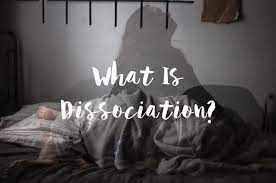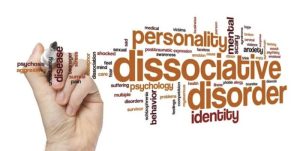Contents
- 1 What Is Dissociation?
- 2 Different Types of Dissociation
- 3 Common Symptoms of Dissociation
- 4 How Dissociation Helps People With Trauma?
- 5 Can Dissociation Be Harmful in Any Way?
- 6 How Can People Manage and Deal With Dissociation?
- 7 Tips for dealing with dissociation
- 8 Who Experiences Dissociation?
- 9 Depersonalization- Derealization
- 10 Dissociative Amnesia
- 11 Dissociative Identity Disorder
- 12 Treatment Of Dissociation
- 13 Self-care Tips For A Patient With Dissociation
- 14 Conclusion
- 15 A Word From Therapy Mantra
What Is Dissociation?
 Dissociation is a psychological term that refers to a disconnection between an individual’s thoughts, emotions, memories, and sense of identity. This can manifest in different ways, such as feeling detached from one’s body, seeing oneself from outside of one’s body, or feeling like one is watching oneself act from a distance. Dissociation can be a coping mechanism used to deal with trauma or overwhelming experiences.
Dissociation is a psychological term that refers to a disconnection between an individual’s thoughts, emotions, memories, and sense of identity. This can manifest in different ways, such as feeling detached from one’s body, seeing oneself from outside of one’s body, or feeling like one is watching oneself act from a distance. Dissociation can be a coping mechanism used to deal with trauma or overwhelming experiences.
Different Types of Dissociation
There are three primary types of dissociation:
- Dissociative amnesia
- Dissociative fugue
- Depersonalization disorder
Dissociative amnesia is the most common type and refers to forgetting important personal information, such as memories of past events or knowledge about oneself. Dissociative fugue is a rare type of dissociation that involves traveling away from one’s home and assuming a new identity. Depersonalization disorder is characterized by feeling detached from one’s self as if the individual has become disconnected from his or her own body (also known as derealization).
Common Symptoms of Dissociation
Symptoms of dissociation include-
- Difficulty remembering important personal information, such as memories of past events or knowledge about oneself.
- Feeling detached from one’s body and any thoughts or emotions relating to the present,
- Looking in a mirror and not recognizing the reflection as oneself,
- Time passes slowly or quickly when experiencing an event,
- Feeling like one is watching oneself act from a distance,
- Feeling like one’s actions is not under his or her control.
How Dissociation Helps People With Trauma?

Dissociation may be a protective coping mechanism that helps an individual deal with trauma or overwhelming experiences. Dwelling on the past and reliving difficult, personal experiences can trigger symptoms of anxiety and depression. By distancing oneself from past trauma, it is easier to confront the present rather than the past.
Dissociative disorders are primarily seen in individuals who have experienced some kind of trauma, such as sexual abuse. Dissociation can be an effective coping mechanism that allows the individual to remove himself or herself from the traumatic situation or direct emotions related to the stressful experience.
Can Dissociation Be Harmful in Any Way?
Dissociative symptoms are often thought of as harmful. Because they may arise in individuals who have experienced traumatic events or difficult circumstances. This could lead people to view these individuals as mentally ill, rather than someone who has used dissociation as a coping mechanism. Although this may be true in some cases, it is important to realize that dissociative symptoms alone do not indicate or cause mental illness.
For most people, dissociation is not harmful and may actually help them cope with difficult situations. However, for some people dissociation becomes a constant state and makes it difficult to work, form relationships, or otherwise take care of oneself. Thoughts and emotions related to one’s present surroundings become distant as the person remains focused on past traumas. This could lead to other mental disorders, such as depression or post-traumatic stress disorder (PTSD).
Mental health professionals are trained to recognize different types of dissociation. And healthy ways for individuals to cope with stressful circumstances. If an individual is struggling with overwhelming thoughts and experiences. He or she may benefit from speaking with a therapist who can help identify unhealthy patterns of dissociation and develop healthier coping methods.
How Can People Manage and Deal With Dissociation?

One of the best ways to manage and deal with dissociation is to speak openly about the experience. Instead of trying to suppress or ignore personal experiences, it may be helpful for individuals to talk about their past traumas and the ways in which they cope with dissociative symptoms. By doing so, other people are able to understand what an individual has been through, support his or her decision to deal with the present instead of dwelling on the past, and remind him or her that it is okay to move forward.
Tips for dealing with dissociation
There are a few things that can help individuals manage and deal with dissociation.
- First, it is important to talk openly about the experience with others. This can help individuals feel supported and understood.
- Second, it is helpful to focus on the present rather than the past. By confronting the present, individuals can work on creating a better future for themselves.
- Finally, it is essential to remember that dissociative symptoms alone do not indicate or cause mental illness.
Dissociation is a coping mechanism that helps individuals deal with difficult experiences. It can be an effective way to remove oneself from the traumatic situation or direct emotions related to the stressful experience.
Who Experiences Dissociation?

Dissociative disorders are primarily seen in individuals who have experienced some kind of trauma, such as sexual abuse. Dissociation can be a helpful coping mechanism that allows the individual to remove himself or herself from the traumatic situation. However, for some people dissociation becomes a constant state and makes it difficult to work, form relationships, or otherwise take care of oneself. Thoughts and emotions related to one’s present surroundings become distant as the person remains focused on past traumas. This could lead to other mental disorders, such as depression or post-traumatic stress disorder.
Mental health professionals recognize different types of dissociation. And healthy ways for individuals to cope with stressful circumstances. If someone is struggling with overwhelming thoughts and experiences. Then speaking with a therapist who can help identify unhealthy patterns of dissociation and develop healthier coping methods may be beneficial.
Being open about an experience with others, focusing on the present instead of the past, and remembering that it is okay to move forward can assist individuals in managing their dissociative symptoms.
Depersonalization- Derealization
Depersonalization is when an individual feels disconnected from himself or herself and becomes emotionally numb to others and their environment. They may feel like everything is “fake” and not real which often results in them watching themselves from outside of their body (known as “out of body experiences”). They may struggle to recognize their face in the mirror and feel like they’re stuck and cannot move.
Derealization is when an individual feels disconnected from his or her surroundings; people and objects can appear foreign and surreal. It’s often hard to tell if these “dreamlike” images are really there or not which can lead them to become confused about their environment (such as time, place, physical condition, etc.). These feelings can cause anxiety or panic attacks due to a loss in reality. Depersonalization-derealization disorder is characterized by episodes that happen suddenly, last for a few moments up to hours at a time, and usually occur randomly in daily life. Diagnosis requires five dissociative symptoms including depersonalization, derealization, and disorientation as well as two memory gaps and two changes in identity.
Dissociative Amnesia
Dissociative amnesia is when an individual blocks out traumatic or stressful experiences from their memory. They may not remember anything about a specific event, time period, or people they know which can make it difficult for them to function as normal as others do (since they’re essentially forgetting the majority of their life). When someone has dissociative amnesia, they also tend to avoid situations that might trigger memories. It could cause distress such as avoiding crowded areas or watching news related to crime. These feelings can last anywhere from a few minutes up to years and can result in difficulty maintaining employment, personal relationships, or even taking care of one’s self.
Dissociative Identity Disorder

Dissociative identity disorder (previously known as multiple personality disorder) is when an individual adopts two or more separate identities. They carry different memories, emotions, and thoughts. Some people switch from one identity to the other without being aware of it. While others may have up to 100+ personalities.
They may experience memory loss related to specific parts of their life such as forgetting how they got somewhere, what was said between two people during a conversation, or who they just met. These feelings can cause distress especially when trying to maintain relationships with family members or friends. Dissociative identity disorder is characterized by having two or more distinct or split identities/personality states which recurrently take control over behavior. This disorder should not be confused with stress-related alterations in a person’s usual personality (frequently seen in periods of severe stress).
Treatment Of Dissociation
There are various treatments for dissociation which help meet the needs of the individual. Some of these treatments include:
1. Cognitive Behavioral Therapy (CBT) – CBT is a type of therapy that helps individuals identify and change the thoughts and beliefs that contribute to their dissociative symptoms.
2. Eye Movement Desensitization and Reprocessing (EMDR) – EMDR is a type of therapy that helps individuals process traumatic memories in a more healthy way. It involves having the individual focus on specific eye movements while talking about their traumatic memories.
3. Psychoeducation – Psychoeducation is when an individual learns more about their disorder and the different symptoms they may experience. This can be done one-on-one with a therapist or in a group setting.
4. Medications – Some people can benefit from certain medications which can be prescribed by their psychiatrists such as anti-anxiety, antidepressant, and antipsychotic medications.
5. Self-Help And Coping Skills – Some people learn to help themselves through practicing various coping skills such as deep breathing, going on a walk, listening to music, reading a book, etc.
6. Therapy For Significant Others – If someone has a loved one with dissociative disorder, they may benefit from therapy as well in order to cope with their feelings of low self-esteem and self-worth due to the patient’s symptoms.
7. Family Therapy – In some cases involving children with the dissociative disorder it is important for parents and siblings to attend family therapy sessions not only for the child but for themselves as well so that everyone can cope with this type of disorder more effectively.
Self-care Tips For A Patient With Dissociation

Living with dissociation can be difficult and it’s important to take care of oneself both physically and emotionally. Here are some self-care tips for individuals living with dissociation:
1. Make sure to get enough rest and relaxation – It’s important to allow oneself time to relax and de-stress. Patients can do this by taking a hot bath, reading a book, taking a walk, etc.
2. Eat healthily – Eating healthy foods helps the body to function at its best. Make sure to include fruits, vegetables, whole grains, and lean protein in your diet.
3. Avoid alcohol and drugs – Using alcohol or drugs can further impair one’s ability to cope with dissociation and can also be damaging to the body.
4. Make sure to get enough physical activity – Too much sitting can make symptoms worse, so try getting some exercise every day.
5. Connect with others – Social support helps people feel better about themselves and cope with stress more effectively; having supportive friends and family members is beneficial for everyone’s well-being. Focusing on gratitude also helps remind us that there are many things. That we should be thankful for in life no matter how small they may seem.
6. Practice relaxation techniques – This can be done through deep breathing or meditation. Inhaling deeply and exhaling makes it easier for the body to relax, which helps with the stress response.
7. Remember that dissociation is not your fault – Sometimes it’s hard to remember this when you always feel like there is something wrong with you but it’s true! The fact that someone has a dissociative disorder doesn’t mean they are defective or bad; sometimes things just happen that we don’t have control over.
Conclusion
Dissociation is a complex disorder that requires a lot of support from loved ones in order to overcome it. If you or someone you know has a dissociative disorder. It’s important to seek help from a mental health professional as soon as possible. So that the right treatment plan can be created specifically for your needs.
A Word From Therapy Mantra
Your mental health — Your psychological, emotional, and social well-being — has an impact on every aspect of your life. Positive mental health essentially allows you to effectively deal with life’s everyday challenges.
At TherapyMantra, we have a team of therapists who provide affordable online therapy to assist you with issues such as depression, anxiety, stress, workplace Issues, addiction, relationship, OCD, LGBTQ, and PTSD. You can book a free therapy or download our free Android or iOS app.


